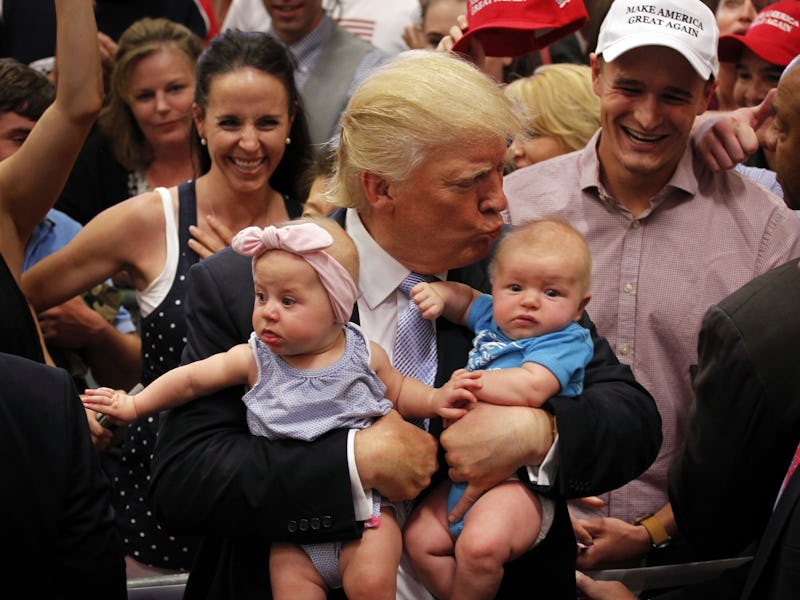Why Voters Should Fear Baby-Kissing Psychopaths
Campaign norms make it easy for members of a disproportionately psychopathic profession to hide their intentions.

Politicians snake through crowds, shake hands, take selfies, sign autographs, eat at local diners, and kiss babies. These activities are assumed to be basic, transparent gambits designed to indicate the general relatability of poll-tested candidates. Economist Ryan Murphy of Southern Methodist University can confirm that, yes, vote grabbers do these things to appear empathetic and appealing to voters, but he’s ready to make a strong case that these activities should be viewed with extreme suspicion because they obscure, by design or happenstance, psychopathy. And that’s not a small thing in politics, a field disproportionately populated by psychopaths.
In his to-be-published paper, “Kissing Babies to Signal You Are Not a Psychopath,” Murphy makes the case that, though baby-kissing doesn’t a psychopath make, it is an act in keeping with less appealing behaviors, like pathological lying and manipulation. That would be less of a concern, he says, if the rates of psychopathy were lower in the political arena, but studies show that between one and four percent of politicians exhibit psychopathic behavior. In literature reviews, civil servants are listed as the tenth most disproportionately psychopathic profession. And research has also shown a positive correlation between American presidents and commonly accepted psychopathic traits, particularly dishonesty.
Given that context, the normalization of behaviors that help psychopaths disguise their motive is disconcerting.
“‘Kissing a baby’ is the cliche that encapsulates the need politicians have to exhibit certain behaviors to gain the trust of enough voters to get elected,” Murphy explained in an email to Inverse. “The opposite of kissing a baby (signaling you are less likely to be a psychopath) is something like having a scandal (signaling you are more likely to be a psychopath).”
The logic gets circular, and the confusion that causes serves the ends of those hiding their intentions.
Murphy wrote his analysis based on an economic school of thought — Virginia School of Political Economy — that assumes humans are rational beings and make decisions based on the information given to them. Murphy argues that politicians use some game theory to create a public image that allows them to outwit voters by presenting themselves as just nice and normal enough for the vote. The fact that this has become obligatory encompasses more than civic theater; it features the pursuit of individual goals.
“Politicians use the political system to maximize their narrow self-interest,” Murphy explained. “This would be rational if viewed in terms of homo economicus — you have your selfish ends like pleasure or consumption and use whatever means you have to attain them. It would also be rational in terms of other more modern definitions of rationality. It may not be rational in the sense of ‘logical for society as a whole’ or ‘if everyone behaved this way.’”
That part, appealing to a large swath of people for personal interest, might ring particularly true in this election year. Oxford University psychologist Kevin Dutton, author of the 2012 book The Wisdom of Psychopaths, has observed psychopathic traits in both Hillary Clinton and Donald Trump, though the latter’s Psychopathic Personality Inventory score is significantly higher (and higher than Adolf Hitler’s, as well).
“I am not diagnosing anyone in particular with psychopathy,” Murphy hedges. “I am not trained to do so. But even if politicians are only one to four percent psychopathic, this still should inform how we should think about our political institutions.”
More than anything, Murphy’s argument is a reminder of the troubling fact that political leaders often hide their true motives successfully.
“It should be visceral evidence for the claim that severe restraints should be put on government, even if it, at times, feels like they just get in the way,” Murphy adds.
The strongest argument for smaller government, it turns out, may be that politicians in general — and baby kissers, in particular — shouldn’t be trusted.